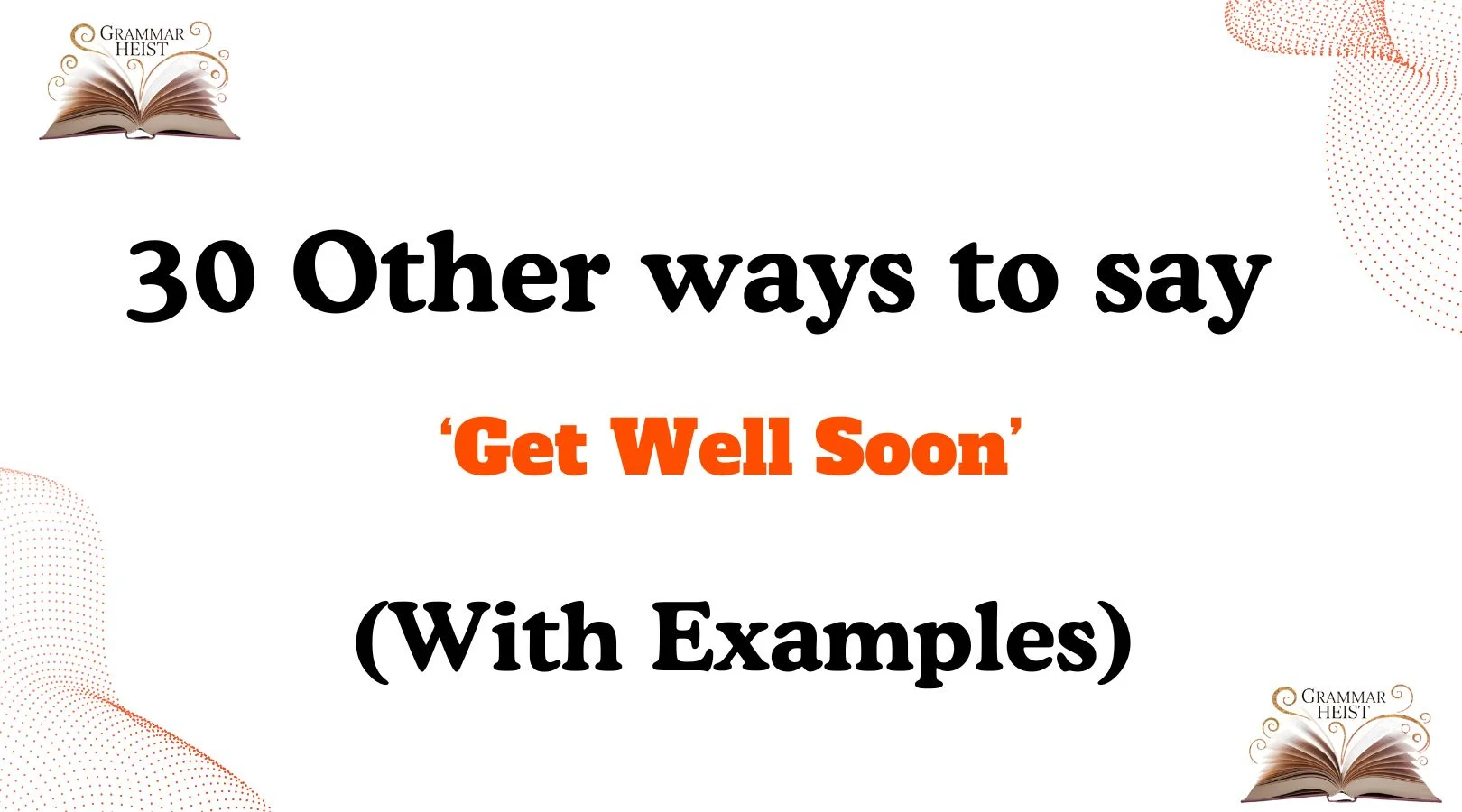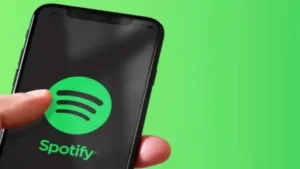Finding the right words when someone isn’t feeling their best can make all the difference. A thoughtful message goes beyond the usual “get well soon” and shows that you truly care. Whether it’s for a colleague, a close friend, or a family member, the way you phrase your well wishes can bring warmth, comfort, and encouragement. Below, you’ll discover 30 meaningful alternatives to saying “get well soon,” along with scenarios, examples, and explanations to help you choose the perfect wording for any situation.
What Does “Get Well Soon” Mean?
The phrase “get well soon” is a caring expression used to wish someone a speedy recovery from illness, injury, or even emotional hardship. It communicates empathy and hope, letting the person know you’re thinking of them and wishing them strength.
Is It Professional/Polite to Say “Get Well Soon”?
Yes—“get well soon” is considered both professional and polite. It’s widely accepted in workplaces, personal relationships, and even formal notes. However, using more personalized alternatives can make your message sound warmer and more genuine.
Pros or Cons of Saying “Get Well Soon”
Pros:
- Universally understood and polite.
- Short, kind, and respectful.
- Appropriate in almost every context.
Cons:
- Can feel generic or overused.
- May lack the personal touch depending on your relationship with the recipient.
- Doesn’t always reflect deep empathy.
Synonyms For “Get Well Soon”
- Wishing You a Speedy Recovery
- Hope You Feel Better Soon
- Take Care of Yourself
- Sending Healing Thoughts
- Praying for Your Recovery
- Wishing You Strength and Comfort
- Hoping for Better Days Ahead
- Take It One Day at a Time
- Thinking of You During This Time
- Hope You’re Back on Your Feet Soon
- Rest Up and Feel Better
- Wishing You a Smooth Recovery
- Hope Each Day Brings You More Strength
- Wishing You Peace and Healing
- Get Plenty of Rest
- Sending You Positive Energy
- Wishing You Comfort and Care
- Hope You’re Feeling Stronger Soon
- Here’s to a Healthy Recovery
- Take It Easy and Heal Well
- Hoping for a Quick Bounce Back
- May You Find Strength Each Day
- Feel Better at Your Own Pace
- Sending You Warm Wishes
- Hoping You’re on the Mend
- Take All the Time You Need
- Hoping You Find Relief Soon
- Wishing You Gentle Healing
- Hope You’re Back to Smiling Soon
- Wishing You Better Health Ahead
1. Wishing You a Speedy Recovery
Scenario: Use when you want to keep the tone professional yet caring.
Examples:
- “Wishing you a speedy recovery, we can’t wait to have you back at work.”
- “Sending you my best wishes for a quick recovery.”
- “Hope your recovery is smooth and swift.”
Tone: Professional, polite, and considerate.
Explanation: This phrase is encouraging and shows thoughtfulness. It works well in professional settings while still sounding warm.
2. Hope You Feel Better Soon
Scenario: A softer, more conversational alternative, ideal for friends and family.
Examples:
- “Hope you feel better soon—sending hugs your way.”
- “Thinking of you and hoping you’re back on your feet quickly.”
- “I hope today brings you more comfort than yesterday.”
Tone: Warm, friendly, and empathetic.
Explanation: This phrase is casual but heartfelt. It feels personal and supportive without being too formal.
3. Take Care of Yourself
Scenario: Best for reminding someone to prioritize their health.
Examples:
- “Please take care of yourself—we miss you.”
- “Don’t worry about work, just take care of yourself.”
- “Remember to rest and take care of yourself during this time.”
Tone: Supportive, gentle, and caring.
Explanation: This reminds the recipient to rest and recover, showing genuine concern for their well-being.
4. Sending Healing Thoughts
Scenario: Suitable when you want to sound thoughtful and heartfelt.
Examples:
- “Sending healing thoughts your way during this time.”
- “My thoughts are with you—wishing you comfort and peace.”
- “May these healing thoughts bring you strength.”
Tone: Gentle, compassionate, and warm.
Explanation: This phrase emphasizes emotional support and empathy, making it ideal for more personal relationships.
5. Praying for Your Recovery
Scenario: Use when the person values spirituality or religion and would appreciate prayers.
Examples:
- “Praying for your quick recovery and strength.”
- “You are in my prayers—may you feel better soon.”
- “Sending prayers of healing and comfort your way.”
Tone: Spiritual, caring, and hopeful.
Explanation: This phrase is best when the recipient has a faith background. It provides comfort and reassurance through spiritual support.
6. Wishing You Strength and Comfort
Scenario: Suitable for someone facing a tougher or longer recovery journey.
Examples:
- “Wishing you strength and comfort as you heal.”
- “May each day bring you more strength and peace.”
- “I hope you find comfort in knowing we’re all thinking of you.”
Tone: Encouraging, compassionate, and heartfelt.
Explanation: Instead of focusing only on recovery, this phrase highlights resilience and comfort, which can feel more empathetic.
7. Hoping for Better Days Ahead
Scenario: Ideal when someone is having ongoing health struggles.
Examples:
- “Hoping for brighter and better days ahead for you.”
- “May tomorrow bring more ease and healing.”
- “Wishing you peaceful days filled with progress.”
Tone: Optimistic, uplifting, and supportive.
Explanation: This is less about immediate recovery and more about long-term positivity, making it ideal for someone on a healing journey.
8. Take It One Day at a Time
Scenario: Use when the person needs encouragement during a slow or difficult recovery.
Examples:
- “Take it one day at a time—you’re doing amazing.”
- “Healing takes time, so take it one step at a time.”
- “Don’t rush, just take each day as it comes.”
Tone: Gentle, patient, and reassuring.
Explanation: This phrase helps reduce pressure on the recipient. It encourages them to be kind to themselves while healing.
9. Thinking of You During This Time
Scenario: Perfect for showing support when you may not know exactly what to say.
Examples:
- “Thinking of you during this time and sending love.”
- “You’ve been on my mind—I hope you’re doing better.”
- “Just wanted to say I’m thinking of you and your recovery.”
Tone: Thoughtful, caring, and considerate.
Explanation: A simple yet warm way to remind the person they’re not alone. It works in both personal and professional contexts.
10. Hope You’re Back on Your Feet Soon
Scenario: A slightly casual yet encouraging phrase for colleagues or friends.
Examples:
- “Hope you’re back on your feet soon—we miss you at the office.”
- “Looking forward to seeing you back on your feet again.”
- “Hope your strength returns quickly so you’re back on your feet.”
Tone: Friendly, supportive, and uplifting.
Explanation: This conveys positivity and anticipation for their return to normal life, making it both practical and kind.
11. Rest Up and Feel Better
Scenario: Use when you want to remind someone to rest and recover.
Examples:
- “Rest up and feel better—we’ll handle things until you’re back.”
- “Please take the time to rest up and regain your strength.”
- “Rest up, don’t push yourself, and feel better soon.”
Tone: Casual, warm, and supportive.
Explanation: This phrase encourages the person to focus on self-care without guilt, often used between friends, family, or teammates.
12. Wishing You a Smooth Recovery
Scenario: A professional yet warm choice, often used in workplace settings.
Examples:
- “Wishing you a smooth recovery and sending best wishes.”
- “May your recovery be steady and without hurdles.”
- “I hope your recovery process goes smoothly.”
Tone: Professional, respectful, and caring.
Explanation: This conveys thoughtfulness without being too personal, making it appropriate for colleagues or acquaintances.
13. Hope Each Day Brings You More Strength
Scenario: Use when someone is gradually healing or facing a long recovery.
Examples:
- “Hope each day brings you more strength and comfort.”
- “Wishing you steady progress every day.”
- “May each new morning bring you closer to full recovery.”
Tone: Encouraging, gentle, and uplifting.
Explanation: This phrase emphasizes progress and resilience, which can motivate someone going through a longer healing process.
14. Wishing You Peace and Healing
Scenario: Ideal when someone needs not just physical but also emotional comfort.
Examples:
- “Wishing you peace and healing during this time.”
- “May your days ahead be filled with peace and healing.”
- “Sending you thoughts of peace, comfort, and recovery.”
Tone: Gentle, comforting, and compassionate.
Explanation: This is especially meaningful when the illness is serious or emotionally challenging, offering holistic support.
15. Get Plenty of Rest
Scenario: Great for when you want to encourage someone to slow down.
Examples:
- “Please get plenty of rest—you need it.”
- “Don’t push yourself, just get plenty of rest and relax.”
- “Everything can wait, focus on getting plenty of rest.”
Tone: Supportive, kind, and caring.
Explanation: A reminder that rest is part of recovery. This is suitable for friends, family, and coworkers.
16. Sending You Positive Energy
Scenario: A thoughtful option when you want to sound uplifting and modern.
Examples:
- “Sending you positive energy for your recovery.”
- “All my positive energy is with you right now.”
- “May positivity surround you and bring you strength.”
Tone: Uplifting, modern, and encouraging.
Explanation: This works well for both personal and professional settings, conveying optimism and care.
17. Wishing You Comfort and Care
Scenario: Use when you want to highlight emotional support alongside physical healing.
Examples:
- “Wishing you comfort and care as you recover.”
- “May you feel cared for and comforted every day.”
- “Sending comfort, care, and healing your way.”
Tone: Warm, kind, and empathetic.
Explanation: This phrase provides reassurance that the person is supported and cared for, making it very compassionate.
18. Hope You’re Feeling Stronger Soon
Scenario: Best for someone who’s been unwell for a while.
Examples:
- “Hope you’re feeling stronger soon.”
- “Wishing you renewed strength each day.”
- “May you feel stronger and healthier with every sunrise.”
Tone: Encouraging, hopeful, and gentle.
Explanation: Focuses on the idea of regaining strength, which can be very motivating for someone in recovery.
19. Here’s to a Healthy Recovery
Scenario: Slightly celebratory, good for cards or messages with positive vibes.
Examples:
- “Here’s to a healthy recovery and brighter days ahead.”
- “Raising a toast to your health and healing.”
- “Here’s to your recovery being quick and smooth.”
Tone: Cheerful, supportive, and optimistic.
Explanation: This phrase adds a celebratory note to healing wishes, making it more lighthearted while still caring.
Read More:30 Other Ways to Say ‘Congratulations to You Both’ (With Examples)
20. Take It Easy and Heal Well
Scenario: Great for friends or coworkers who tend to overwork.
Examples:
- “Take it easy and heal well—we’ve got things covered.”
- “Don’t rush, just take it easy and focus on healing.”
- “Take it easy and give your body the rest it deserves.”
Tone: Gentle, friendly, and considerate.
Explanation: Encourages the person to slow down and not feel pressured, which shows genuine care.
21. Hoping for a Quick Bounce Back
Scenario: Ideal for friends or coworkers who usually recover quickly and need encouragement.
Examples:
- “Hoping for a quick bounce back—you’ve got this.”
- “Can’t wait to see you bounce back stronger.”
- “Here’s to you bouncing back in no time.”
Tone: Energetic, encouraging, and upbeat.
Explanation: This phrase is lively and motivating, great for someone with a positive outlook or strong personality.
22. May You Find Strength Each Day
Scenario: Good for longer-term illnesses or when recovery requires patience.
Examples:
- “May you find strength each day as you heal.”
- “Sending you strength for the journey ahead.”
- “I hope every day brings you new strength.”
Tone: Supportive, gentle, and encouraging.
Explanation: This phrase emphasizes daily resilience, making it ideal for tough or drawn-out recoveries.
23. Feel Better at Your Own Pace
Scenario: Best when you want to remind someone not to rush healing.
Examples:
- “Feel better at your own pace—we’ll be here for you.”
- “Take all the time you need, feel better at your pace.”
- “Don’t worry about rushing, heal in your own time.”
Tone: Reassuring, thoughtful, and patient.
Explanation: Shows respect for the person’s healing process and reduces pressure to recover quickly.
24. Sending You Warm Wishes
Scenario: A general, heartfelt option that works in any context.
Examples:
- “Sending you warm wishes for your recovery.”
- “Warm wishes to you as you rest and heal.”
- “My warmest wishes for your health and comfort.”
Tone: Kind, caring, and universally polite.
Explanation: This phrase is versatile, making it suitable for professional, friendly, or family use.
25. Hoping You’re on the Mend
Scenario: A gentle way to check in on someone’s progress.
Examples:
- “Hoping you’re on the mend and feeling stronger.”
- “Glad to hear you’re on the mend—keep resting.”
- “Hope your healing continues and you’re on the mend soon.”
Tone: Friendly, supportive, and conversational.
Explanation: Slightly casual yet kind, this works well in everyday conversations.
26. Take All the Time You Need
Scenario: Ideal when someone feels pressure to return to work or responsibilities.
Examples:
- “Take all the time you need—we’ve got things covered.”
- “Don’t worry, just take all the time you need to heal.”
- “Focus on yourself and take the time you need.”
Tone: Reassuring, compassionate, and thoughtful.
Explanation: Encourages rest and removes guilt, showing genuine concern for the person’s health first.
27. Hoping You Find Relief Soon
Scenario: Best for situations where the person is experiencing ongoing pain or discomfort.
Examples:
- “Hoping you find relief soon from this discomfort.”
- “May relief and comfort find you quickly.”
- “Wishing you quick relief and brighter days ahead.”
Tone: Sympathetic, gentle, and supportive.
Explanation: Acknowledges their pain and expresses hope for comfort, which feels deeply empathetic.
28. Wishing You Gentle Healing
Scenario: Especially fitting for sensitive or serious health issues.
Examples:
- “Wishing you gentle healing and peace.”
- “May your healing be steady and gentle.”
- “Sending you wishes for soft, gentle healing.”
Tone: Soft, kind, and tender.
Explanation: Conveys compassion and care, often used when someone is in a fragile state physically or emotionally.
29. Hope You’re Back to Smiling Soon
Scenario: Perfect for close friends or family when you want to add positivity.
Examples:
- “Hope you’re back to smiling soon—we miss your joy.”
- “Can’t wait to see you smiling again.”
- “Your smile makes everything brighter, hope it returns soon.”
Tone: Lighthearted, affectionate, and uplifting.
Explanation: Focuses on emotional recovery and happiness, making the message more personal.
30. Wishing You Better Health Ahead
Scenario: Good for long-term encouragement when someone is focused on recovery and future wellness.
Examples:
- “Wishing you better health ahead and happier days.”
- “Here’s to better health and new energy.”
- “May the future bring you lasting health and peace.”
Tone: Hopeful, forward-looking, and caring.
Explanation: Instead of focusing only on the present, this phrase highlights the person’s future well-being, offering encouragement and optimism.
Conclusion
Finding the right words when someone is unwell is more than just a polite gesture—it’s a way of showing empathy, care, and genuine support. While “get well soon” is a kind and timeless phrase, using thoughtful alternatives can make your message feel more personal and meaningful.
Whether you’re comforting a close friend, encouraging a family member, or supporting a coworker, the expressions above give you plenty of versatile, warm, and professional options. From “wishing you a speedy recovery” to “wishing you gentle healing,” each phrase offers its own unique tone and level of care.
Key reminder: The most important thing isn’t the exact phrase—it’s the sincerity behind your words. Even a short, heartfelt message can brighten someone’s day and give them strength during recovery.

Emma Brooke is a passionate advocate for effective communication and language mastery. As a dedicated professional in the field of grammar and writing, Emma brings a wealth of knowledge and expertise to those seeking to improve their linguistic skills. With a focus on clarity, precision, and style, Emma Brooke is committed to helping individuals refine their language use to communicate confidently and effectively.












